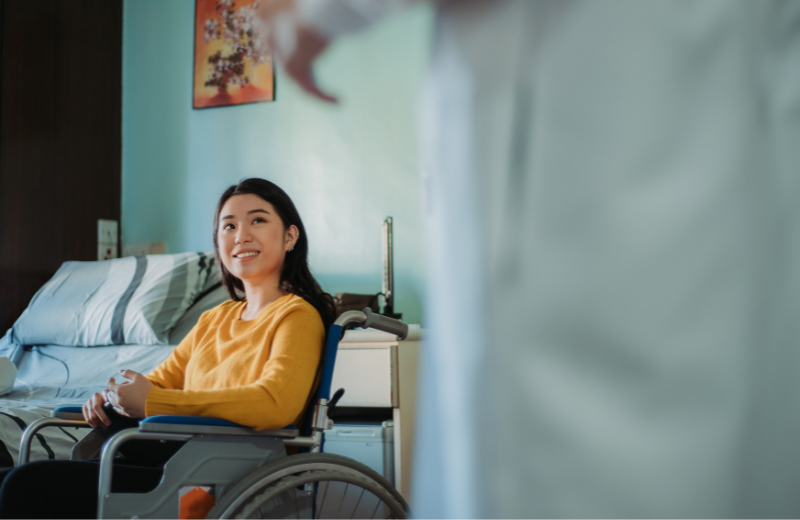
The Staging Transition for Every Patient (STEP) program helps teenagers with chronic and complex childhood medical conditions move to adult health care. Launched in 2020 in the Whitaker Clinic of UAB Hospital, the program has made major progress in caring for some of the state’s most vulnerable patients.
Thanks to improved treatments, many young people with serious health problems are now living longer. Still, complex conditions such as spina bifida, cerebral palsy, inflammatory bowel disease, diabetes, neuromuscular disease, and severe neurologic issues require ongoing care from multiple specialists. When these patients move from pediatric to adult health care, the transition involves more than just transferring medical records. The complexities of medical treatments, insurance changes, and other issues often create challenges for patients and their family members and caregivers.
That’s where the STEP program comes in. The first formal program of its kind in Alabama and the surrounding region, STEP helps these young adults move from pediatric care at Children’s of Alabama hospital to adult care at UAB Medicine.
Making the transition
Some primary care physicians lack experience in treating chronic childhood diseases, and many health care providers are unfamiliar with the many resources these patients require as they enter adulthood. Knowing where to refer them for specialty care, supplies, medical devices, housing, school/work, financial assistance, and legal questions often falls outside the scope of a doctor’s practice. The STEP program helps ensure that patients are matched with primary care physicians and other providers who are prepared to manage complex medical conditions.
UAB Medicine’s STEP primary care clinic for patients 18 and older provides medical care, referrals to adult specialists, and transition plans specific to each patient and family. The goal is to prevent gaps in medical care and provide access to support services such as physical therapy, social work, counseling, and emergency planning.
The program also helps prepare Children’s of Alabama patients age 14 and older for adult health care. This includes learning how to make appointments, get medications from a pharmacy, build independence, and develop general skills needed to manage their health in adulthood.
Program growth
In the three years since it started, the program has seen progress in many areas of its mission. Under the leadership of Medical Director Carlie Somerville, M.D., and Program Director Betsy Hopson, STEP has provided care for over 460 patients to date. It recently added three physicians and a full-time nurse coordinator to its staff, which includes specialists from 10 departments and 15 divisions within Children’s of Alabama and UAB Medicine. To help train future providers, the STEP program hosts 1-4 medical students and residents from multiple specialties each week.
In 2022, the program received a grant from the Alabama Council on Developmental Disabilities to help fund educational presentations for adult primary care doctors throughout the state. In March 2023, STEP held its second annual conference, titled “STEP Toward a Successful Transition”, and the event helped educate patients, their families, and providers on the value of the program. Dr. Somerville said these markers of progress are indicators of both success and opportunity in this area of care.
“We are thriving now, as our patients and their parents have become very comfortable in the clinic,” Dr. Somerville said. “The growth of this collaboration between Children’s and UAB means that our team is familiar with the doctors and nurses who are involved, and we know from experience how to hold all of these pieces together and coordinate the transition to achieve better outcomes. We are more equipped than ever to surround our patients with all the elements of support they will need in the adult care world.”
Dr. Somerville said raising awareness of the STEP program – among both pediatricians and patients – is important because it creates connections with primary and specialty care doctors. Greater awareness also helps adult primary care providers deliver better care to patients who require complex care coordination.
“Right now, many professionals in adult health care aren’t comfortable with these diagnoses, because they usually haven’t had the exposure or training,” Dr. Somerville said. “So a big part of STEP is our push to provide awareness, exposure, and teaching that will prepare future health care professionals. That’s why we are attending national, regional, and local conferences, teaching in medical schools, and bringing students and residents into our clinics. Awareness and education are central to our work.”
Creating a new norm
Along with its ongoing awareness efforts, the STEP program is exploring new opportunities to expand and improve care.
“For example, while our outpatient clinic is having much success, we are seeing the struggles many of our patients face when they are admitted to the inpatient setting,” Dr. Somerville said. “So a lot of our focus is on working with hospital task forces and leaders to find what we can improve, specifically for our young adults with autism, intellectual disability, and technology dependance.”
Dr. Somerville said the program is committed to making smooth transitions to adult care become the new norm.
“This patient population and their needs for a successful transition to adult care are not new,” Dr. Somerville said. “What is new is that we are finding solutions, successfully implementing them, and sharing those findings across all disciplines and especially in primary care. Along with providing excellent care, all of our team members serve as full-time advocates for this patient population and the program that serves them.”
Referrals to the STEP program can be made by the patient’s Children’s of Alabama pediatrician or specialist. Those who are at least 18 years old can schedule a new patient appointment with the STEP Clinic by calling the UAB Primary Care Access Center at 205-801-7474. To begin a transition from Children’s of Alabama, please call 205-638-9100 and ask to be connected with the STEP program.
